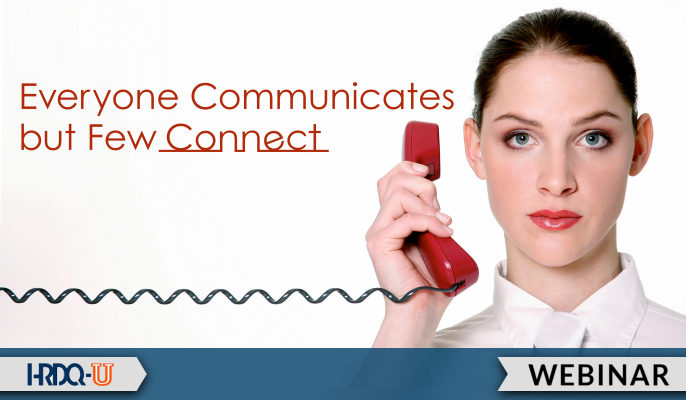- 827 Lincoln Ave. #B-10 West Chester, PA 19380
- support@hrdq.com
- +1-610-279-2002
Quick Links
Menu
Featured Topics
Menu
Total Results
We could not find what you're looking for. Please try again.No Record Found
Don’t miss this upcoming event from HRDQ-U

The ability to communicate effectively is absolutely crucial to be successful both in business and in relationships. In this informative webinar, you will discover that real communication boils down to the ability to connect with people.
You will walk away with thought-provoking questions to ask yourself that will help you connect on common ground with your employees and coworkers, as well as things you can easily avoid doing so that you can open the lines of communication in a new and exciting way. The ability to really connect with people is a skill you can absolutely learn and implement today!
This live event is free. A recording will be available after the event with an HRDQ-U Membership for Learning Professionals.


What’s My Communication Style
Strong communication skills are essential for your organization to perform optimally, especially during challenging times. This assessment and accompanying workshop options significantly improve communication skills across your organization by providing valuable insights and strategies for enhancing effective communication and teamwork.
Take 15% OFF with code CONNECT15
Patti Massullo is a certified leadership and professional development coach and Maxwell DISC Trainer. She has been an entrepreneur most of her adult life, owning both online and offline businesses. Patti has mastered the art of communication using proven strategies to help businesses create compelling new ways to connect in every area of their life, both at home and in the workplace. Also certified in mental health and brain health, Patti is passionate about how people are wired and thrives on helping individuals and companies work and play to their strengths.
Training Tools for Developing Great People Skills
This event is sponsored by HRDQ. For 45 years HRDQ has provided research-based, off-the-shelf soft-skills training resources for classroom, virtual, and online training. From assessments and workshops to experiential hands-on games, HRDQ helps organizations improve performance, increase job satisfaction, and more.
Learn more at HRDQstore.com

Monique F.
Assistant Director
George Washington University


“Ms. Massullo was organized, well-prepared, and engaging. She’s a fine example of the communication styles presented.”
Sean H.
Education Support Specialist
Germanna

Sign up to be notified of upcoming live webinars, in-depth workshops, podcasts, blog posts, promotions and much more. Stay ahead of the curve and subscribe for FREE today!
9 Responses
Question: What is an effective way to deal with opt out group?
Answer: Oh, I hear you. Well, now if it’s in a work situation, they may not have a choice, but I guess if it is a situation where they, they can opt out if they choose to. Again, it would be trying to find out a little bit more about that person and maybe why they want to opt out. Maybe there’s a reason. Maybe there’s something that’s happening. Maybe there’s something that makes them uncomfortable. Again, I’m talking about a work atmosphere Right now if it if it was a friend group, it’d be a little easier because you can go just go talk to your friend. But if it’s in a work situation, and somebody has the option of being in on whatever it is that the group is doing, whether it’s social or business, is finding out maybe a little bit more about that person, just get to know them a little bit, one on one, maybe, maybe that would make them feel more comfortable wanting to be part of the group after that.
Question: What suggestions do you have for building and strengthening a connection with someone who may become a future client?
Answer: Well, I think some of the things that we talked about today, getting to know them, getting to learn a little bit about them, not just what the you know, a little bit about the company, if there’s anything you can find out about that person. And again, I don’t mean this in a facetious way, like, you know, you’re trying to play them, I mean, authentically find out what it is that they that they like, what is it that you know, maybe look them up on social media, find out a little bit about their company, of course, you want to know that, especially for a client, you don’t want to go in there cold not knowing who you’re talking to. But also asking them, I mean, finding out a little bit about them as a person, because that is, that is huge. I heard a story recently, I’m going to share with you real quick, because it’ll, it’ll illustrate this point. And this was a story about Warren Buffett about how when people wanted to interview Warren Buffett, you know, like he, he always says, when he allows somebody to interview him, they have to go through his people, obviously, he gives them 10 minutes. And that’s it. And this woman who was a journalist that wanted to interview him, she found out that he loved cherry coke. And so she went into that meeting. And she said, Thank you, Mr. Buffett, for your time, I appreciate the 10 minutes that you’re going to give me. And she said, the candidate cherry coke down and she said, but before we start, I wanted to give you your favorite beverage. And he said to her, you have all the time you need, and she was there for an hour and a half. So that might be a little bit of an exaggeration, but it’s a true story. And so you can never know enough about that person. And I don’t mean you should go in there and spew off Dana, everything you know about them. But just having that leg up, because I’ll tell you what, a lot of your competition are not going to take the time to do it. So I think that’s a great practice.
Question: How long should you wait before you respond to a difficult email?
Answer: Oh, that’s a great one. When someone sends you an email, the benefit of that is that you’re not standing in front of them and you have time to think it over. Right. The disadvantage is what you say back? So I know your question had more to do with the timing of it. But again, I think it would depend on what it’s about and who it came from. But overall, I would say that it’s for you know, email etiquette type thing. You know, you don’t have to respond immediately. You could give it 24 hours. And if you feel like it’s something that you can’t really get yourself. And I know this wasn’t your question, you asked more about timing, but if you can’t really say it the way you want to say in an email, I’ve learned to reread emails and reread text messages before I send them because a lot of times we can get ourselves in trouble because we it comes across different than what we meant it to. So I always say to somebody, if somebody sends you an email or a text message, and it’s a little volatile, or it’s going to require a discussion, I would ask if maybe we could have a face to face discussion. But as far as just the pure timing of it, I would say, depending on what what it is, if they’re just calling you out on something that they want you to address, you know, take a couple of days, if it’s your boss doing it, and wants you to do something, but he’s being a bully about it, I still would take 24 hours, but it wouldn’t take forever, if that makes sense.
Question: How do you tell a coworker that they need to communicate differently to you?
Answer: Okay, well, that is a challenge. And the reason it’s a challenge is because if you’re not, if you don’t understand like, this is one of the things we do with disk. And this is one of the things we teach in the disc workshop, is knowing when you know, everyone you work with, when you have an idea of what they’re what they are. And if you’re the opposite, let’s just say they’re a DI and you’re an SC, standing for, di is dominance and influence. I’m an ID. So I’m very, I’m a people person, I’m all about, you know, being out there talking, getting to know people, and dominance is my second, my second one. But then I have a husband who is an SC, he’s very steady, he’s very compliant. And so we’re complete opposites. But here’s the thing, when you know what somebody else is, this is where that would come in handy, is knowing what the personality is. Because if you know that you’re able to connect with that person in a whole new way. One of the things we do, one of the things we go into detail with that assessment, I would suggest you go into the drawing if maybe you’ll win that because is it teaches you that even though people are different than you, there are specific strategies that you can use to get along with a person that’s different than you are.
Question: Can emotional intelligence be taught?
Answer: I think there are very few things that can’t be taught. I’m a big believer in taking areas that we want to be better at. And I mean, I do understand that your strengths are the things that you want to polish and make the best you can be because we can’t all do everything. But I definitely think that we can learn emotional intelligence, for sure.
Question: Would you say emotional intelligence is considered an aspect of making a connection when communicating?
Answer: I would say, Yeah, I would say so.
Question: Can a supervisor say thank you or great job too much?
Answer: Can the supervisor say thank you, or great job too much? I guess you would say this is a matter of opinion. And I would say no, absolutely not. I think that the more we appreciate people, the more they want to do for us. And I don’t mean that in a way that you should do it selfishly, because you should do it authentically and mean it. But I think that people are starving for not just attention, but for affirmation. And I think that just letting them know, you know, and it can be just the simple words of thanks so much. You don’t have to always elaborate sometimes it does call for you to elaborate. But other times, it can be as simple as saying, Thank you. I appreciate you Giovanni, great job, whatever it is. I personally think that we can never say that enough. And you know, just telling somebody, you’re proud of them. If I was mentoring a girl not too long ago where I told her I was proud of her and she kind of hung her head and I I asked her what was wrong. And she said, well, that makes me uncomfortable because no one’s ever been proud of me before. And so sometimes people will react like that because they’re not used to people appreciating them. So I just think we live in a world where people need to know that they’re appreciated.
Question: Do you feel like a field concepts like attachment theory, emotional safety and empathy are critical for connection?
Answer: Wow, that’s a great question. Because I do have some certification in mental health. So I do think that it is important, but not everybody. You know, not everybody knows those, that terminology or knows that, that they’re doing that. But I would say if you know, the situation that you’re you’re dealing with, and the person that you’re dealing with that it would be critical. But it really depends on the situation. And if you are dealing with someone that has either some not necessarily a mental illness, but mental health issues, and it doesn’t even have to be something like bipolar or personality disorder, it can be something as simple as someone that has other types of issues where they they’re not able to respond well. So it is important to know, especially if you if you think someone has mental health issues, or if you even suspect it.
Question: What are some tips to talk yourself down before you have an emotional reaction to something that a coworker did or said?
Answer: I actually have a great example of this. I once had a client who said, and I thought it was funny at the time, and you may not do exactly this, but you could do something similar. He said that whenever he had a situation at work, where it fired him up, because he was in a very stressful job, he would go in a room by himself, and he would do push ups. I know that sounds funny, but he said it just defuse the situation. So my suggestion would be, you may not want to go do push ups, or maybe you do, but it would be to stop and walk away from the situation before you say anything. Because it’s really important that we don’t say the first thing that comes out of our mouth. Because when we do, we almost always regret it. So just taken a few minutes and tried to defuse the situation. And I realized, sometimes depending on the situation, you may not be able to do that. And if that’s the case, where you can’t leave the room, and you really do have to say something, I would just think before you you respond to that person. And it’s kind of like the golden rule, you know, always being the better person, I would say, take the high road and not buy into someone’s emotional response, and just just be the person that that responds, well, no matter what that is, sometimes it may even just be, you know, I appreciate what you have to say. And, you know, we can agree to disagree. And, you know, we’ll talk about that another time and putting it on the back burner or something like that. Hopefully that answers your question.